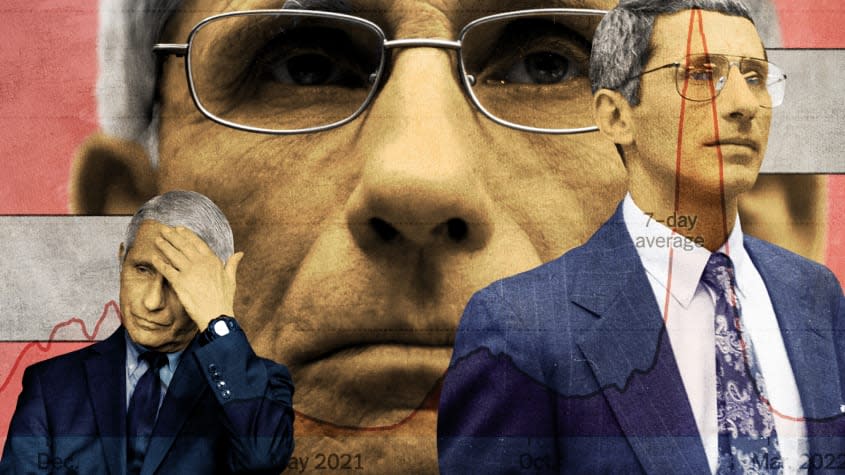What legacy does Fauci leave behind?

- Oops!Something went wrong.Please try again later.
Dr. Anthony Fauci is retiring from government service. The nation's top infectious disease expert — and the face of the U.S. government's response to the COVID pandemic — said Monday he will leave his role at the end of the year. "I want to use what I have learned as NIAID Director to continue to advance science and public health and to inspire and mentor the next generation of scientific leaders as they help prepare the world to face future infectious disease threats," he said in a public statement.
Fauci leaves government with more than 50 years in public service, and having served seven presidents, but — for better and for worse — has drawn the most attention of his career during the coronavirus pandemic. For some, he's been a hero. "Without Fauci's steady leadership, the COVID-19 pandemic would have created more havoc on our country than we could possibly imagine," the Kansas City Star said in an editorial. For others, mostly on the right, his role in urging lockdowns and vaccines has made him a villain. "His overgrown ego … led him to promote the most destructive federal and state policies in recent US memory," the New York Post editorialized. What will be Anthony Fauci's ultimate legacy?
Fauci's advice was always on the mark
COVID brought out the "armchair Twitter critics and politicians who considered themselves more knowledgeable and experienced on matters of infectious diseases" than the nation's leading expert on the topic, Paul Brandus writes at MarketWatch. In truth, Fauci's advice to America during the pandemic was pretty simple: "Wear a mask. Get vaccinated. Social distancing." But his many right-wing critics chose to view that advice "through the lens not of medicine but political loyalty." And that criticism distorts Fauci's legacy as "a towering figure in the U.S. medical community, deeply respected both here and abroad" for his work not just on COVID, but HIV and numerous other infectious diseases. "All Americans owe this man a debt of gratitude for his unwavering commitment to public health."
A flawed COVID response is his legacy
Fauci became the "main symbol of the rule by experts" who "brooked no scientific debate on COVID," The Wall Street Journal says in an editorial. Among his sins: A "refusal even to consider" the possibility the coronavirus originated in a Chinese lab; smearing "the few brave scientists who opposed blanket lockdowns" during the pandemic's first year; and a mistaken over-reliance on mask and vaccine mandates. That's not entirely his fault: "Dr. Fauci's influence was all the greater because he had an echo chamber in the press corps and among public elites who disdained and ostracized dissenters." It's not Fauci's fault that the pandemic was so unpredictable, but the "certainty of his policy prescriptions" was wrongheaded. In the end, "Dr. Fauci was as much a politician as a scientist."
It's time for Fauci to disappear
Fauci's pandemic-era public relations blitz "harmed the credibility of and respect for the public-health establishment," Timothy Carney writes for the Washington Examiner. That's why the doctor "should gracefully disappear from the public spotlight" in retirement. (And he definitely shouldn't "cash out" by taking a job in private industry.) If he ends up being a talking head on cable news programs, it "will be even more political, more self-aggrandizing, and thus, more corrosive of the public's trust in public health policy." After all, Fauci's own credibility has been harmed by questions about whether the American government was involved in China's coronavirus research, and he has equated criticisms of his actions as attacks on science. Best to simply silence himself: "Fauci should do the country a favor by quietly disappearing and enjoying his retirement."
Don't forget his role in the fight against AIDS
"In the darkest days of the AIDS epidemic, Dr. Fauci never gave up," Dr. Gregg Gonsalves, an AIDS activist and an associate professor of epidemiology at Yale, writes for The New York Times. Fauci was sometimes a controversial figure during the early days of that earlier epidemic — he "took heat from AIDS activists" but emerged with "the impression that science could handle these challenges" through the hard work of research and experimentation. "We fought, and we argued, for sure, but we moved ahead together, never satisfied with the status quo." The development of protease inhibitors that allow people with HIV to live longer, healthier lives was a sign "that at least there could be progress" in the fight against infectious diseases. The COVID era has tested that assumption. American leaders have surrendered to "resignation in the face of the suffering" in the still-ongoing pandemic. That doesn't erase Fauci's legacy, however: "We should all have his resolve and commitment."
You may also like
Trump envoy releases letter from National Archives deemed 'extraordinarily damning' for Trump
5 cartoons about Trump's rage over the Mar-a-Lago raid
DeSantis' challenger, Manhattan's clash of Democratic titans: A quick look at Tuesday's primaries

